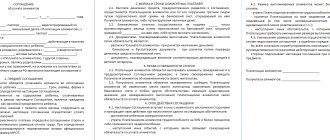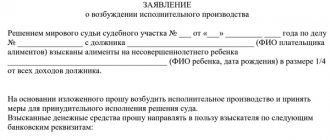Home / Family law / Alimony
Back
Published: March 24, 2020
Reading time: 3 min
5
3112
The main regulator of family relations is the Family Code of the Russian Federation, in which articles 80-85 and 107 are devoted to alimony relations between parents and children.
Despite the existence of a mechanism clearly developed by law for providing a child with funds from the parent with whom the child does not live, statistics present a rather sad picture, according to which the percentage of arrears in child support is huge. Does a child, including those who have reached the age of majority, have the right to recover from their parent the funds due to them?
- Cases of payment of alimony after the child reaches the age of majority
- The procedure for collecting alimony after the child reaches the age of majority
- Instead of conclusions
The legislative framework
Several legislative acts regulate issues of payments for children. In the Family Code, the procedure and conditions of alimony obligations are determined by Chapter No. 13, which includes the following articles:
- – the obligation of parents to provide financially for minor children;
- – the amount of alimony payments established in court;
- – types of income from which deductions are made;
- – the procedure for collecting alimony in a fixed amount;
- – maintenance of children in orphanages or foster families;
- – providing for adult children who do not have the opportunity to work;
- – payment of additional expenses for the child.
In Art. 99 Federal Law No. 229 of October 2, 2007 provides data on the maximum possible percentage of alimony deductions from the parent’s income.
Resolution No. 841 of July 18, 1996 lists the financial sources from which alimony is written off.
Child support after 18 years of age is provided if he is not able to provide for himself financially. This category includes disabled citizens and people with disabilities since childhood.
Important! If an adult child receives an education and does not have health problems, his parents are not obliged to support him, since he has legally acquired legal capacity and can earn money himself.
When can a court reject a claim?
As a rule, the obligations established by law to support parents are fulfilled voluntarily and no difficulties arise.
But if help is needed and the parent cannot support himself, then the only option is legal action.
Only it is provided by law. After all, no other body has the authority to oblige individuals to perform certain actions. Accordingly, the father needs to prepare a statement of claim and submit it to the court. These are alimony claims. However, a simplified procedure, as when collecting funds from parents, is not allowed here. After all, it is necessary to prove some difficult points.
Difficult points need to be reflected in more detail, this will make it clear the grounds for refusing the claim:
- you should justify your need for support from the child . The law directly refers to the elderly age of the parent or the inability for health reasons to support themselves. These arguments need to be substantiated. This means that the father must provide documents to the court hearing. For example, this could be a health certificate. Documents are often provided confirming the difficult financial situation and so on;
. That is, it must be reflected that the defendant is the son or daughter of the plaintiff. Since this circumstance is basic, it must be proven documented. Otherwise, the judge simply will not have grounds to consider the claims on their merits. After all, the very existence of an obligation is based on family relations, so they should be proven first of all;
it is necessary to indicate a family relationship with the defendant- it is necessary to prove that the child has the opportunity to support his father . He must have a job or alternative income.
Based on this, the court will make one or another decision on the requirements. All evidence provided will be verified and evaluated. Therefore, you should not count on unambiguous, indisputable satisfaction of requirements.
In cases where the father has filed for child support, refusal to satisfy the requirements is known in judicial practice and is not uncommon.
When a child has a large number of obligations to support his children, the father may be denied. After all, a son or daughter may simply not have an objective financial opportunity to transfer funds to their father. The defendant's ability to work is key.
If he is unable to work and earn income, then the claim cannot be satisfied. However, the inability to work must be proven and documented. This should be an objective fact. For example, the presence of physical disabilities.
Refusals are often associated with the father having his own income. For example, he has a disability and cannot work due to this. At the same time, he receives an old-age pension and additional disability benefits. In total, his earnings will be quite a decent amount. Then the court may decide to refuse to satisfy the requirements.
In this case, the courts are based on the cost of living. This is the value of the funds that are needed to meet basic needs. The amount is set at the national level. And each region takes its own values, which cannot be lower than the minimum established by the Government of the Russian Federation. Accordingly, the court compares the father’s total income with the cost of living in the relevant region. If the income is higher than the specified value, then the claim will be denied.
Amount and procedure of payments
For a disabled child who has celebrated his 18th birthday and is receiving education, alimony is transferred in the amount agreed upon by the parents or established by the court. In the latter option, during the proceedings, the amount of income of the mother and father is determined, after which the amount of the monthly payment is negotiated. A claim for alimony is filed directly by an adult child or his legal representative (mother, father, guardian).
According to the RF IC, payments for an adult disabled citizen must be made in a fixed amount, in contrast to alimony for children under 18 years of age. But the law does not establish a specific minimum or maximum.
When the court considers the need to support an adult child, the regional subsistence level or the size of the consumer basket must be taken into account. Periodically, these indicators increase, and accordingly, the amount of alimony is indexed. This is done by bailiffs or accounting employees of the enterprise where the parent works.
If a spouse or other relatives live with a disabled adult citizen, he has the right to demand payment of alimony from his parents and legal representatives.
Conditions and registration of alimony collection
To collect child support for adult children, the following factors must be present:
- biological or social relationship with the payer,
- age up to 20 years inclusive (for payments for the past period),
- disability and neediness with no age restrictions.
Registration of such alimony occurs in the usual manner. However, in order to receive funds for the past period, only an appeal through a claim proceeding is required. Because here it is necessary to provide the court with evidence of taking measures to collect alimony.
As for child support for an adult child with a disability, it is also permissible to conclude a child support agreement. But it will not be possible to collect payments under a court order. Since the claimant needs to prove the fact of his need for financial support from the parent.
The agreement may, by mutual agreement, establish any alimony amounts. The law does not establish maximum minimum and maximum payments here.
Important! The student status itself, contrary to popular belief, does not in any way affect alimony payments. As well as the form of education (full-time or part-time).
What amount of alimony can be assigned to a student?
The volumes of alimony penalties for the past period are identical to regular alimony and are equal to:
- ¼ of the payer’s income - per 1 child,
- 1/3 - for 2,
- ½ - for 3 or more.
For a needy adult child with a disability, alimony is collected only in a fixed form, taking into account significant circumstances: financial well-being, marital status of the parties.
Attention! For past periods, alimony can also be collected in a fixed form if the alimony holder does not have a constant, stable income.
Maintenance of an adult child
Children who have become adults can oblige their parents to provide for them financially only when the following conditions are simultaneously met:
- need for money - registration of low-income status is carried out if the per capita income in the family is below the subsistence level;
- disability – the child is assigned disability group 1, 2 or 3.
In the absence of these criteria, parents cannot be involved in paying child support after 18 years of age. Full-time education does not apply to exceptional situations.
According to Art. 1 Federal Law No. 181 of November 24, 1995, people who are limited in their capabilities and in need of social protection are recognized as disabled. The process of assigning disability was approved in Decree of the Government of the Russian Federation No. 95 of February 20, 2006.
In Russia, disability can be assigned both for an indefinite period and for a certain time. If at the time of filing the claim, the disability document has expired, and the medical commission has not made a decision to extend it for a new period, then the disabled child cannot claim child support from the parent. In such situations, the court always refuses to satisfy the claims.
Determination of signs of need in all cases is carried out individually. The expenses of a disabled person for purchasing medications, undergoing rehabilitation, the need for operations, additional nutrition, etc. are taken into account.
Changes in the Family Code of the Russian Federation
The latest edition of the RF IC was made at the end of 2020. Currently, there are no amendments to this codified law that will come into force in the near or future.
As for categories indirectly related to the topic of alimony penalties, from July 1, 2020, the all-Russian minimum wage indicator will be equal to 7,800 rubles. Accordingly, similar regional indicators cannot be less than the declared value.
As for the second key category that determines the amount of alimony assigned in a fixed form - the subsistence minimum - its amount is left to the local authorities. Every year, the regional government calculates the cost of the consumer basket, determines the dynamics of prices for essential products, inflation, etc.
Based on the analysis of the totality of this data, a separate subsistence level is formed in each region. Moreover, it also differs for different categories of citizens. In particular, a subsistence minimum (subsistence minimum) is provided for the adult working population, pensioners, and children.
Important! It is precisely in view of the existing difference between the regional indicators of the minimum wage and the subsistence level in various constituent entities of the Russian Federation that there is a wide variation in the alimony payments prescribed in a fixed form.
Video about collecting child support for adult children.
Attention! Due to recent changes in legislation, the legal information in this article may be out of date! Our lawyer can advise you free of charge - write your question in the form below:
Is it necessary to pay child support after 18 years of age if the child is studying?
The legislation does not provide for the possibility of filing a claim for alimony for an adult studying in an educational institution, provided that he is not in need and is able to work. Child support payments automatically stop when the child turns 18, even if the student is studying full-time.
A bill introducing changes to family legislation has been repeatedly submitted to State Duma deputies for consideration. In particular, a proposal was put forward to extend the withholding of child support from parents whose children receive full-time education until the age of 23. The bill was rejected.
Sample statement of claim for alimony for an adult disabled child
Before using the presented sample statement of claim for alimony for an adult disabled child, we recommend that you familiarize yourself with the basic rules for filing claims.
| To the magistrate of judicial district No. _____ in the city ____________ Plaintiff: ______________________ (full name, address) in the interests of __________________ (child's full name, address) Defendant: ___________________ (full name, address) Statement of claim for the recovery of alimony for an adult childThe defendant is the father (mother) of _________ (full name of an adult child) “___”____________ ____ year of birth. The defendant does not live with the child _________ (specify the reason), and does not provide financial support. _________ (full name of an adult child) is incapacitated _________ (indicate the reason for incapacity for work) since “___”____________ ____, which is confirmed by _________ (which confirms the incapacity for work). _________ (full name of an adult child) needs financial assistance, since his income consists of _________ (indicate the source of income of an adult child, the amount of this income per month). The defendant does not want to resolve the issue of financial assistance out of court _________ (indicate the reasons), an agreement on the payment of alimony was not concluded. The defendant must pay alimony for the maintenance of his adult child in a fixed sum of money, the amount of maintenance should be ____ rubles, which will make it possible to ensure a decent existence for the adult child. Please take into account the marital status of the parties when deciding the amount of alimony to be paid _________ (indicate the marital status of the child and the defendant, the presence of obligations to support other persons). Taking into account changes in consumer prices, it is necessary to determine a mechanism for indexing alimony collected for the maintenance of an adult disabled child in need of help, based on changes in the size of the subsistence level. Based on the above, guided by Articles 85, 117 of the Family Code of the Russian Federation, Articles 131-132 of the Civil Procedure Code of the Russian Federation, Ask:
List of documents attached to the application (copies according to the number of persons participating in the case):
Date of application “___”_________ ____ Signature of the plaintiff: _______ |
:
Statement of claim for child support for an adult child
Student Support Agreement
Art. 99 of the RF IC gives parents the right to draw up and sign a voluntary agreement on the maintenance of a joint child after he turns 18 years old. In practice, such documents are concluded quite often.
The agreement must reflect the following information:
- Full name, passport data, residential address of the child and the parent who will pay child support;
- monthly maintenance amount - indicates a percentage of income or a fixed amount;
- The duration of the document is reaching the age of 23, obtaining a diploma, employment, etc.
The drawn up agreement is certified by a notary. An adult child is present at the procedure.
If in the future the parent refuses to fulfill the financial obligation created as a result of signing a voluntary agreement, then for forced collection it is enough to transfer the document to the employees of the FSSP service. They initiate enforcement proceedings.
How to file a claim for child support for an adult
Alimony for the maintenance of disabled, needy adult children is collected by the court. The amount of alimony is determined based on the financial capabilities of the parents and the needy adult child, the level of income of each of them, the availability of property and funds on deposits.
When determining the amount of alimony, the court will take into account the existing additional obligations of the alimony payer, the composition of his family, and other facts that determine the ability of the parents to pay maintenance. In addition, the level of needs of the alimony recipient must be taken into account.
Parents are obliged to support their disabled adult children when the need for financial assistance is determined; alimony is collected regardless of the presence of other persons obligated to provide financial support to needy adult children (spouses, children, harm doers and others).
Child support can be recovered from one or both parents. The amount of alimony must be a multiple of the minimum subsistence level established in the constituent entity of the Russian Federation where the plaintiff lives.
How can you prove the need to support a student child?
To obtain a positive court decision in the case of payment of alimony for an adult student, it is necessary to confirm his need for material support. Need is determined based on information obtained from various sources.
For the trial, the following documents must be prepared:
- a certificate from the educational institution with a mandatory mention of the presence or absence of a scholarship;
- certificate of tuition fees;
- photocopy of the child's student passport;
- information about the salary of the parent permanently residing with the child (if there is no employment, a certificate from the Employment Center or the social protection department is provided);
- a document confirming that the student does not work anywhere;
- a photocopy of the child’s work record (if available);
- a medical report on a chronic illness of an adult, a certificate of the need for constant medical care and the purchase of certain medications, a certificate of disability.
To initiate the process of forced collection of alimony payments for an adult disabled student, additional documents may be required. Consulting with a lawyer will help you clarify their list.
General principles of alimony collection
According to general rules, child support payments are collected only from minor children.
However, on the Internet you can find various materials stating that it is possible to extend the collection of alimony for adult students. As a rule, the law does not provide for such norms. That is, it will be possible to recover alimony for an adult child of a student for the past time preceding the application. If the student is already 20 years old, then for a one-year period from 17 to 18 years old. If you are 19, then from 16 to 18. And if you have just turned 18, then from 15 to 18 years old.
Download for viewing and printing:
Family Code of the Russian Federation
The RF IC also records one more exception to the rules: the presence of a disability in an adult child.
Collection rules
If alimony has never been paid, but the recipient has made efforts to obtain it, then the RF IC allows an appeal to the court for recovery for past periods.
But within the last 3 years from the date of application. Therefore, theoretically, even if a child student is already 20 years old, then alimony can be recovered for past periods within the period established by law.
Important! Upon reaching the age of 21, it will not be possible to collect alimony for the past period. Since the past periods will no longer include the statutory deadlines for alimony payments. That is, up to 18 years of age.
Another opportunity to collect child support for adult children is the child’s disability and his need for outside financial assistance. Under such conditions, a child who has reached the age of 18 can independently or through representatives apply to the court for the recovery of alimony.
Attention! In the latter case, the law does not limit the claimant to his age or other time periods.
How to prepare a statement of claim?
To recover alimony for an adult student, you need to draw up a competent and substantiated claim. The header of the document must indicate the name of the court to which the application is being submitted, as well as information about the participants in the proceedings. The plaintiff can be the parent who permanently lives with the child, or the child himself.
The main part of the claim contains a brief summary of the history of the family relationships of the former spouses, followed by information about the joint child. The text contains his full name, date of birth, name of educational institution. This is followed by an indication of all the circumstances according to which the child needs to be provided with additional financial support. If there is documentary evidence of the reasons for need, a reference to these papers is made.
Before moving on to claims, you need to justify the amount of child support payments that will be collected from the second parent. It is recommended to provide detailed calculations so that when considering the statement of claim, the court does not have doubts about the justification of the plaintiff’s demands. According to judicial practice, the presence of digital displays in a document increases the chances of a positive outcome of the case.
The procedure for collecting alimony after the child reaches the age of majority
As it becomes clear from the above, if the child is an adult and has no restrictions on his legal capacity, then he will go to court on his own behalf. If a person is incompetent, despite reaching the age of majority, then his interests will be represented by a person appointed as a guardian by court decision.
The general order is as follows:
- first it is necessary to establish on what basis the alimony was awarded - by agreement or by court decision, since this directly determines exactly how further developments will occur;
- the next step is to find this agreement or court decision (you need to go to the archive if the document itself has not been preserved). This must be done, since, otherwise, there is no guarantee that the court will accept the case for consideration;
- After these documents have been prepared, it is necessary to file a statement of claim. There are certain requirements for its preparation, which I will discuss below;
- since the court will study information about whether there were any attempts to collect alimony from the negligent parent, it will be necessary to provide evidence that there were no such payments, or information about the volume of payments made;
- In addition, an evidence base (including witness testimony) should be prepared about whether such a parent took part in raising the child or not.
As for drawing up a statement of claim, in family proceedings the rules that are characteristic of civil proceedings apply. Therefore, the requirements for drawing up a statement of claim will be similar, namely:
- in the address part it is necessary to indicate to which court this application is being sent (the rule is that the statement of claim is sent to the place of permanent registration of the defendant; but subject to the provision of information that the plaintiff, for objective reasons, cannot apply to that court (if areas appeals are different), the place of appeal of the plaintiff may be the court at his place of registration);
- also in the address part, full identifying information about the plaintiff (his passport details, as well as information about the place of registration and actual residence and contact information), as well as about the defendant (all the same information is filled in);
- the amount of the claim in this case is not indicated, since it cannot be known exactly - the court will determine it independently;
- The next step is to fill out the main part of the statement of claim. In this part, it is necessary to provide a complete description of the current situation: when alimony obligations arose, and on what basis this arose (if a court decision was made, then the date and place of its issuance, as well as the case number; if an alimony agreement was concluded, then identifying information about it agreement);
- the final part of the application indicates the demands that the plaintiff makes to the parent who evaded the performance of his duties. At the same time, if the specific amount that must be recovered cannot be indicated, the need to request alimony for a certain period of time (from the moment the obligation to pay it arises or from the moment a situation of evasion arises) should be indicated.
Is it possible to receive alimony from a donor of biological material?
Registration procedure
Extension of alimony payments after 18 years can be arranged voluntarily or compulsorily.
In a voluntary form, the potential plaintiff and defendant enter into an agreement with each other, in which they independently determine the amount and procedure for paying financial assistance. There is no limitation period for alimony issues.
Submitting an application
If a peaceful method is not possible, resorting to the courts cannot be avoided.
At the same time, both the parent or the person replacing him or her, as well as the teenager himself (if he has legal capacity), can apply for alimony.
The application must indicate:
- Full name of the plaintiff and defendant;
- Full name, date of birth of the child (if the application is submitted on behalf of the legal representative);
- directly the facts justifying the payment of alimony (requirements).
The application is submitted to the magistrate's court at the place of residence of the plaintiff or defendant. There is no limitation period for alimony issues.
Package of documents
To file a claim in court you will need:
- passport;
- marriage certificate or divorce certificate (if the claim is filed by the child’s legal representative);
- TIN;
- certificate 2-NDFL from the place of the parent living with the child;
- a certificate or agreement documenting the fact of training;
- medical certificate confirming the assignment of a disability group;
- a certificate from the MFC about the cohabitation of the plaintiff and the teenager (if the claim is not filed by the adult himself).
The court has the right to request other documents. Copies must be attached to all listed documents.
A case from judicial practice
A number of claims for alimony are brought by adult students who do not have health problems. As an argument, they cite the contents of Art. 2 of the Federal Law “On State Pension Provision”, which classifies full-time students as disabled citizens. On such grounds, alimony has never been collected.
An example of resolving such uncertainty is the appeal ruling in case 11-69/2017, issued on May 10, 2017 by the Ordzhonikidze District Court of Magnitogorsk, Chelyabinsk Region. The plaintiff was refused because the said law does not regulate family relations. Another reason for leaving claims unsatisfied was the lack of evidence of disability.









